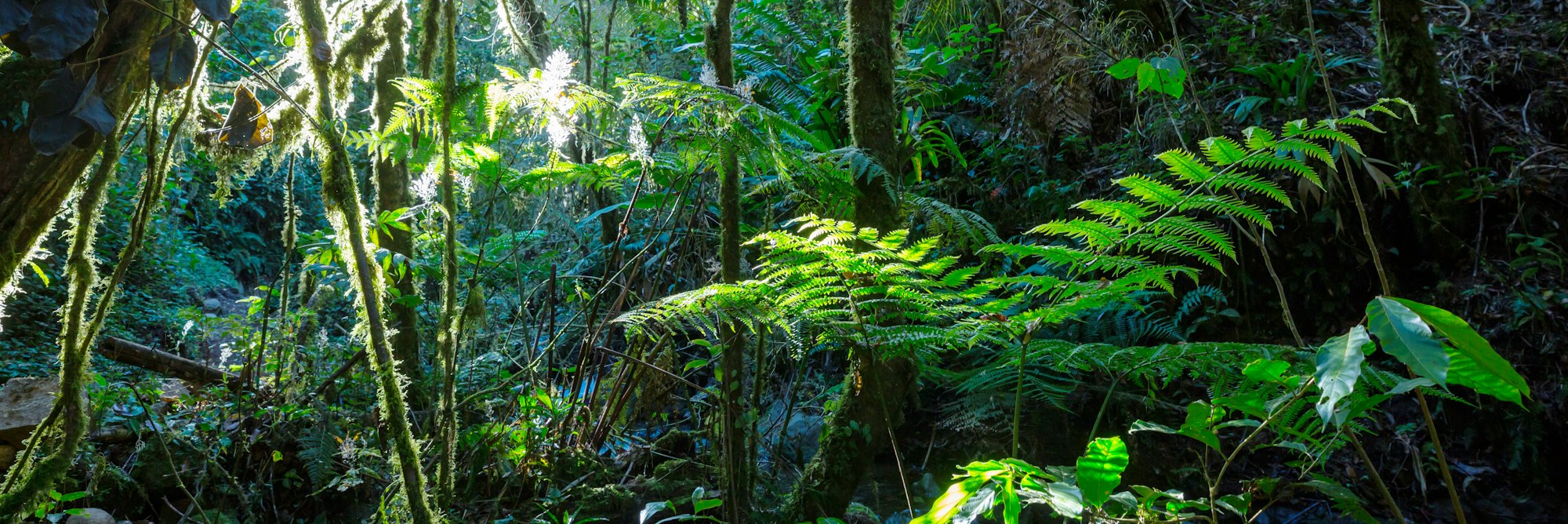How to create an indoor jungle with a focus on large tropical plants?

Adding plants to your indoor space is not just a decorative move; it’s a lifestyle change that promotes healthier living. Plants improve indoor air quality by releasing oxygen and absorbing carbon dioxide. They also add humidity to the air, which can be particularly beneficial in a dry, air-conditioned office. In this article, we’ll guide you on how to create an indoor jungle focusing on large tropical plants. We will discuss selecting the right plants, the best indoor locations for them, and how to take care of them.
Choosing Your Indoor Jungle Plants
When creating an indoor jungle, your choice of plants is crucial. You must consider the plant’s size, light requirements, and how well it can adapt to an indoor environment. Large tropical plants are perfect for an indoor jungle. They have broad leaves that add a lush, vibrant feel to your space.
A lire également : What are the most effective humidity control solutions for a basement home gym?
Monstera Deliciosa often referred to as the Swiss Cheese plant, is one of the best plants for creating an indoor jungle. It is a crowd-pleaser with its unique, fenestrated leaves. Another good option is the Bird of Paradise plant, which grows large, banana-like leaves that will transport you to a tropical paradise. The Fiddle Leaf Fig is also a popular choice for its imposing, sculptural presence.
Remember, these plants will need adequate space to grow. Ensure they’re not crammed in a tiny corner as they may not thrive as well as they would in a spacious area.
Lire également : What are the best tips for creating a home spa in an en-suite bathroom?
Best Location for Your Indoor Jungle
The location of your indoor jungle plays a pivotal role in your plants’ health and growth. Ideally, you should place your plants in a well-lit, airy space. However, different plants have different light requirements. For instance, while the Monstera Deliciosa thrives in indirect light, the Bird of Paradise loves a sunny spot.
The temperature of the area is also important. Most tropical plants prefer a warm environment. Make sure they are not next to air conditioning vents, heaters, or drafty windows.
Indoor Jungle Soil and Pot Selection
Choosing the right soil and pots for your indoor jungle is critical to your plant’s growth and survival. The best soil for indoor plants is well-draining soil. This type of soil allows water to flow through it easily and prevents water-logging at the roots.
When it comes to pots, opt for ones with drainage holes. These will prevent water from sitting at the bottom of your pot, which can lead to root rot.
Large tropical plants will need big pots that can accommodate their root systems. However, don’t go too large too soon. Gradually increase the pot size as your plant grows.
Watering and Air Quality for Your Indoor Jungle
Watering your indoor jungle requires careful attention. Too much water can lead to root rot, while too little can cause your plants to wilt. The best way to water most houseplants is to thoroughly drench the soil and then allow it to dry out before watering again.
Air quality is also a crucial factor in maintaining an indoor jungle. Most large tropical houseplants prefer a higher humidity level than most homes. To increase humidity, you can place a tray of water near your plants, regularly mist your plants, or use a humidifier.
Caring for the Leaves of Your Indoor Jungle
The lush, vibrant leaves of your large tropical plants will need regular care to stay healthy. Dust, pests, and discoloration are all common issues with indoor plants.
To clean your plant leaves, gently wipe them with a damp cloth. This not only removes dust but also helps the plant better absorb light.
Pests can be a common problem for indoor plants, especially in dry environments. Keep a close eye on your plants and act quickly if you notice any signs of pests.
Leaf discoloration can be a sign of a watering issue, pests, or a problem with light or humidity. If you notice any changes in your plant’s leaves, it’s important to diagnose the problem quickly.
Remember, creating an indoor jungle is more than just adding greenery to your home or office. It’s about crafting a space that brings you joy, improves your wellbeing, and connects you with nature. Now that you have the tools and knowledge, you’re ready to create your own indoor jungle.
The Mental Health Benefits of an Indoor Jungle
Having an indoor jungle does not only improve your indoor air quality but also your mental health. Research shows that indoor plants can have a significant impact on reducing stress levels. They offer a calming environment that can help with relaxation and concentration, making them a perfect addition for your home or office.
The large tropical plants like Monstera Deliciosa and Fiddle Leaf Fig can serve as a private retreat in your space, promoting a sense of tranquility and peace. Their unique shapes and vibrant colors can also stimulate creativity, making them a great choice for enhancing your workspace.
Research also suggests that plant care can be therapeutic. The act of watering, pruning, and cleaning your plants can serve as a form of mindfulness practice, helping to divert your mind from stressors and reconnect with nature. It can also provide a sense of satisfaction and accomplishment as your plants thrive and grow, improving your mood and self-esteem.
In addition, the Snake Plants, which can thrive in low light conditions, are a great addition to your bedroom. They are known for their air-purifying abilities, removing toxins and releasing oxygen at night, promoting better sleep quality.
Remember, an indoor jungle is not just about having beautiful, green scenery indoors. It’s also about reaping the mental health benefits that these plants can provide.
Low Maintenance Plants for Your Indoor Jungle
While large tropical plants can create a stunning indoor jungle, some people might be deterred by the thought of the required maintenance. However, there are several varieties of tropical plants that are remarkably low maintenance, perfect for those who may not have a green thumb.
Snake Plants are one of the most robust indoor plants. They can survive in low light conditions and require minimal watering. This makes them an excellent choice for beginners or those who don’t have the time to devote to more demanding plant care.
Likewise, Monstera Deliciosa, despite its exotic appearance, is surprisingly easy to care for. It can thrive in both bright indirect light and low light conditions. It needs to be watered only when the top inch of the soil is dry, reducing the risk of overwatering.
The Fiddle Leaf Fig is another plant known for its hardiness. Although it requires bright indirect light, it’s relatively tolerant of different water conditions. This plant prefers a well-draining soil and should be watered only when the top layer of soil begins to dry.
Having low maintenance plants in your indoor jungle doesn’t mean compromising on aesthetics. With their unique appearances, these plants can still deliver that lush, tropical feel to your space.
Conclusion
Creating an indoor jungle with large tropical plants is the perfect way to transform your space into a green paradise. This isn’t merely a design trend; it’s a lifestyle change that offers immeasurable benefits for the air quality and your mental health.
From selecting pet-friendly plants like the Snake Plant to understanding the light requirements of your Monstera Deliciosa, maintaining an indoor jungle may seem like a daunting task. However, with the right knowledge and some low maintenance plants, you can create a thriving indoor jungle that not only beautifies your space but also enhances your wellbeing.
Remember, plants are living beings that require care and attention. Your commitment to their growth and survival is rewarded with a healthier, happier space. So why wait? Start building your indoor jungle today!
